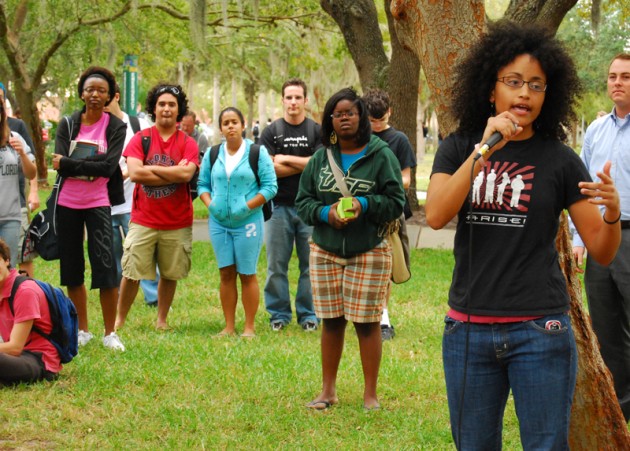“Quina” questions answered

Students don’t have to wonder what it means to “agree with Quina” anymore.
On Thursday, Ivah Quijana Parchment, better known as “Quina,” whose name has been seen chalked on campus sidewalks, printed on fliers and emblazoned on t-shirts, told a crowd of more than 100 what she believes in, clearing up the fog of mystery surrounding her evangelical campaign’s tagline: “Do you agree with Quina?”
An on-campus religious group, Campus Crusade for Christ, distributed the messages between October 9 and October 23.
During her 30-minute speech, Parchment, a USF sophomore majoring in communications, talked about her life and her religious struggles helped shape her beliefs.
“I was inwardly agnostic growing up,” Parchment said, who was originally born in the Philippines and moved to Orlando at a young age. “I didn’t believe the Bible was being true and had many contradictions.”
Parchment had never spoken publicly about her beliefs until Thursday. She said she was nervous the night before the speech, asking herself why she was supposed to be the one talking to so many people hanging on her every word.
“I was talking to God about this before, asking him why me,” she said. “But God has chosen young people before.” Parchment believes she was chosen by God to deliver a message of faith.
A few students, however, felt that Parchment’s philosophy was misplaced.
“I feel that if a Muslim student were to do what she did, the reaction would be very different,” said Megan Morin, a junior majoring in business.
Morin added that she didn’t think it was appropriate for Parchment to express her religious beliefs in a public setting.
“If you have faith, I’m really happy for you, but I don’t need your ideals being pushed on me,” she said. “If you want to express your faith in a church that is fine by me. I’m focused on my education, not the Bible.”
Parchment’s advertisements created much hype at the USF Tampa campus, the kind of hype that junior Emma Hauser could only compare to the excitement about the upcoming presidential election.
“Everybody on campus was asking ‘who is Quina? When is she going to be on campus?’ I think the Quina movement created a lot of buzz around campus,” said Hauser, a public relations major.
Despite the hype, students didn’t compare Parchment’s message to that of the highly criticized street preachers that often visit the front of Russell M. Cooper Hall.
“She is a lot more accepting and loving, she isn’t here to judge anybody,” said Alyson Wise, a freshman majoring in Theater Arts.
Parchment said her presentation is different because she doesn’t shout angry messages at anyone and she is open to talking to people who disagree with her.
“I can only speak for us, our message is out of love,” she said. “I like to hear other people’s perspectives. I encourage and challenge those who disagree to look into the Bible and see where we are coming from as well.”
Parchment’s speech marked the end of the “Do you agree with Quina?” campaign.
She said she was overwhelmed by the attention and thankful for the support she received. She said she hopes her message lives on and people talk about it even after the campaign was over.
For more information, students can go to iagreewithquina.com.







